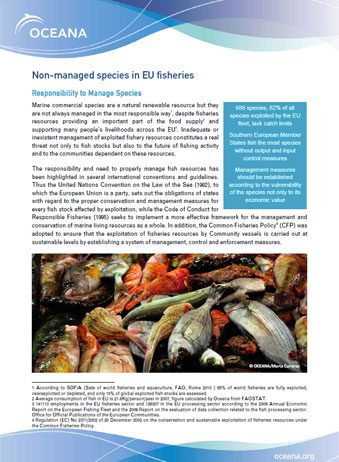Report | March, 2012
Non-managed species in EU fisheries
Responsibility to Manage Species
Marine commercial species are a natural renewable resource but they are not always managed in the most responsible way1, despite fisheries resources providing an important part of the food supply2 and supporting many people’s livelihoods across the EU3. Inadequate or inexistent management of exploited fishery resources constitutes a real threat not only to fish stocks but also to the future of fishing activity and to the communities dependent on these resources.
The responsibility and need to properly manage fish resources has been highlighted in several international conventions and guidelines. Thus the United Nations Convention on the Law of the Sea (1982), to which the European Union is a party, sets out the obligations of states with regard to the proper conservation and management measures for every fish stock affected by exploitation, while the Code of Conduct for Responsible Fisheries (1995) seeks to implement a more effective framework for the management and conservation of marine living resources as a whole. In addition, the Common Fisheries Policy4 (CFP) was adopted to ensure that the exploitation of fisheries resources by Community vessels is carried out at sustainable levels by establishing a system of management, control and enforcement measures.




